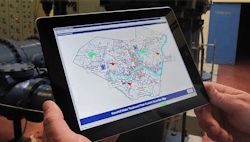Water utility controls remotely with VPN and GE Digital iFix software
Similar to most mobility methods retooling for pandemic duty, remote expertise has been around for a long time. However, until COVID-19 showed up, dialing in the veterans used to mostly happen outside business hours because most of them were at home.
"Mobility is changing because the reasons for it are changing," says Matt Wells, digital product management VP at GE Digital. "The key GE use case for it used to be process visibility and plant monitoring and control. The reason was to enable select mobile operators or allow experts to see and support their process operations in their off-hours, but with COVID-19, we're seeing a dramatic increase in clients demanding this level of support all the time."
Wells reports that GE Digital devised its remote access program just after the overall U.S. shutdown began in mid-March. "Many plants were in a pinch, so we started offering free, time-limited licenses, such as for Webspace, for users to maintain their SCADA systems, including those built around iFix and Cimplicity software," says Wells. "Before the pandemic, our customer support usually helped less-experienced operators working at odd times because the veterans typically worked the day shifts and were less available at night. With COVID-19, many day shift users are now at home, and everyone needs full-time remote support because their software has become even more mission-critical.
"Meanwhile, customers that always wanted suppliers to come to their facilities have shifted to wanting everything done remotely, which could actually make many implementations more efficient. For instance, GE works with many utilities that rely on air-gapped networks and previously didn't allow remote management. However, COVID-19 has triggered a dramatic change. It's taken many users over former hurdles, forced reprioritization, and caused them to accept remote network connections—as long as they can be made securely."
For instance, Haverhill Water Division's 10-member staff was deemed essential when Massachusetts shuttered nonessential businesses in late March. However, even though they could still report to their plant and practice social distancing, if restrictions tightened in the future, they're prepared keep it operating with just one onsite staffer, while the rest manage the utility remotely with GE Digital's iFix software. The 36-square-mile Boston suburb provides more than 2 billion gallons of water per year from three reservoirs to 58,000 residential and commercial customers.
"If restrictions tightened further, we were ready to go," says John D’Aoust, water treatment plant manager, City of Haverhill. “We can get into our plant remotely and operate it via a virtual private network (VPN). No matter what location we’re in, we always have good notifications in place and always know what’s going on.”
In fact, Haverhill has used some form of digital access for 13 years, ever since it upgraded as an early iFix adopter in 2007. This likewise enabled the utility to run with a single overnight operator because the others were authorized to securely connect to the water system, advise and help their colleague, and take action remotely to control each step of their purification, pressure maintenance and distribution processes. These steps include opening and shutting reservoir feeds, setting pumps that control chemical treatments, monitoring pH and chemical levels, and adjusting chemical concentrations. In addition, every pumping station, feed pump and critical motor has a digital alarm linked to iFix.
“If you put the proper plans in place and have the right hardware to enable the necessary security, you can do this safely and securely,” adds D’Aoust, who says his team is prepared if fully remote monitoring is ever required. "As long as it has an adequate supply of chemicals and electricity, this plant will just continue to run.”
Wells adds that mobile technologies are also growing in plants as devices that used to enable workers to get close to machines are repurposed during COVID-19 to help workers maintain social distancing. "Because users want to work remotely or at least stay 6 feet away from each other, GE is seeing an increase in use of mobile versions of many of its products, such as HMI and MES screens and data analysis tools," says Wells. "This will allow software and other products that used to run only on fixed screens on shop floors and in control rooms to get out of those locations, and enable more users to run entire plants on mobile devices. To maintain security, all of these products use the latest secure-by-design technologies, and we advise our customers to follow the recommendations in our secure deployment guides including encryption at the client and server levels.”
About the Author

Leaders relevant to this article:


